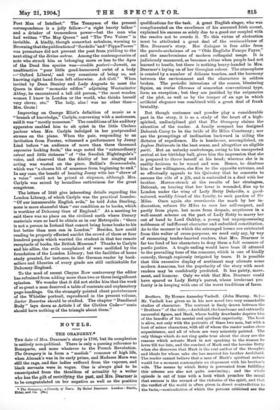THE ORANGERY.*
THE del.,. of Mrs. Dearmer's story is 1796, but its complexion is entirely non-political. There is only a passing reference to Bonaparte, and none whatever to the French Revolution. The Orangery is in form a " modish " romance of high life, when Almack's was in its early prime, and Madame Mara was still the rage, and fine ladies suffered from the vapours, and black servants were in vogue. One is always glad to be emancipated from the thraldom of actuality by a writer who has the gift of revivifying the past, and Mrs. Dearmer is to be congratulated on her negative as well as the positive • The Orangery a Comedy of Tears. By Mabel Dearmer. London : Smith, Elder, and Co. [6s.]
qualifications for the task. A great English singer, who was complimented on the excellence of his assumed Irish accent, explained his success as solely due to a good ear coupled with the resolve not to overdo it. To this virtue of abstention must be attributed a great deal of the vraisemblance of Mrs. Dearmer's story. Her dialogue is free alike from the pseudo-archaisms of an " Olde Englishe Fancye Fayre," and the anachronisms of modern colloquial usage. It is judiciously mannered, as becomes a time when people had not learned to hustle, but there is nothing heavy-handed in Mrs. Dearmer's laying on of her Georgian colour. The atmosphere is created by a number of delicate touches, and the harmony between the environment and the characters is seldom broken. The periodic intrusions of the coarse, blustering Squire, an iratus Chremes of somewhat conventional type, form an exception; but they are justified by the exigencies of the plot, as well as by the temper of an age in which artificial elegance was combined with a great deal of frank brutality.
But though costumes and powder play a considerable part in the story, it is as a study of the heart of a high- spirited, undisciplined girl that The Orangery claims the attention of the reader. A family compact has designed Deborah Carey to be the bride of Sir Miles Courtenay ; nor are the promptings of inclination backward in aiding the dictates of expedience. He is handsome, accomplished, an Inglese Italianato in the best sense, and altogether an eligible parti. But an unlucky contretemps, owing to his unexpected arrival at her birthday ball, gives him the impression that she is prepared to throw herself at his head; whereas she is in reality desirous to be wooed and won. Hence, to disabuse him of her willingness, she flies to the opposite extreme, and so effectually appeals to his Quixotry that he consents to assume the role of a jilt, and is embroiled in a duel with her brother. Horror-struck at the results of her stratagem. Deborah, on hearing that her lover is wounded, flies up to London under the wing of Lady Betty Delaville, a good- natured, worldly friend of the family, to seek pardon of Sir Miles. Once again she overshoots the mark by her in- discretion, refuses Sir Miles to save her self-respect, and partly from pique, but more from despair, acquiesces in a well-meant scheme on the part of Lady Betty to marry her out of hand to Lord Oakley, a young but unprepossessing nobleman of indifferent character and enfeebled constitution. As to the manner in which the estranged lovers are extricated from this welter of cross-purposes, we need only say, by way of reassuring tender-hearted readers, that Mrs. Dearmer is far too fond of her characters to deny them a full measure of poetic justice. A. tragic ending would have bean ill attuned to the prevailing tone of the romance, which is one of kindly comedy, though copiously irrigated by tears. It is possible that this excessive display of sentiment may alienate some modern Amazons, but the popularity of the story with most readers may be confidently predicted. It has gaiety, move. ment, and humour. Only we wish that Mrs. Dearmer could have spared us Lady Betty's parrot, whose irrelevant pro fanity is in keeping with one of the worst traditions of farce.


































 Previous page
Previous page